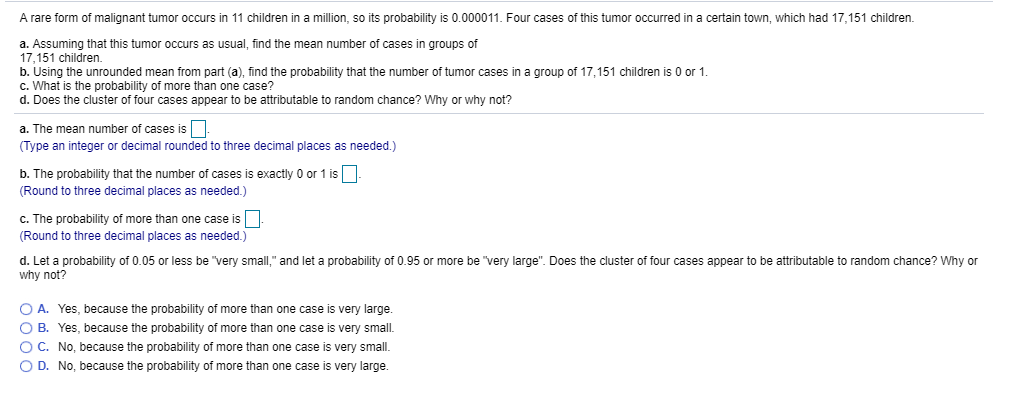
A First Course in Probability (10th Edition)
10th Edition
ISBN: 9780134753119
Author: Sheldon Ross
Publisher: PEARSON
expand_more
expand_more
format_list_bulleted
Question

Transcribed Image Text:A rare form of malignant tumor occurs in 11 children in a million, so its probability is 0.000011. Four cases of this tumor occurred in a certain town, which had 17,151 children.
that this tumor occurs as usual, find the mean number of cases in groups of
7 151 children
b. Using the unrounded mean from part (a), find the probability that the number of tumor cases in a group of 17,151 children is 0 or 1.
c. What is the probability of more than one case?
d. Does the cluster of four cases appear to be attributable to random chance? Why or why not?
a. The mean number of cases is
(Type an integer or decimal rounded to three decimal places as needed.)
f cases is exactly 0 or 1 is
b. The probability that the number
(Round to three decimal places as needed.)
c. The probability of more than one case is
(Round to three decimal places as needed.)
d. Let a probability of 0.05 or less be "very small," and let a probability of 0.95 or more be "very large". Does the cluster of four cases appear to be attributable to random chance? Why or
why not?
O A. Yes, because the probability of more than one case is very large
.... ..
O B. Yes, because the probability of more than one case is very small.
O C. No, because the probability of more than one case is very small.
O D. No, because the probability of more than one case is very large.
Expert Solution
This question has been solved!
Explore an expertly crafted, step-by-step solution for a thorough understanding of key concepts.
This is a popular solution
Trending nowThis is a popular solution!
Step by stepSolved in 4 steps with 3 images

Knowledge Booster
Similar questions
- The probability that a z-score will be between -1.4 and -1.04 is?arrow_forwardA professor of statistics noticed that the marks in his course are normally distributed. He also noticed that his morning classes average 73% with a standard deviation of 12% on their final exams. His afternoon classes average 79% with a standard deviation of 11%. A. What is the probability that a randomly selected student in the morning class has a higher final exam mark than a randomly selected student from an afternoon class? Probability = B. What is the probability that the mean mark of four randomly selected students from a morning class is greater than the average mark of four randomly selected students from an afternoon class? Probability =arrow_forwarda population has mean score of 50 if five points are added to each score what is the new meanarrow_forward
- Mensa requies a test score to be in the top 2%. The test has a mean of 100 and Std. Dev. of 15.and scores are normally distributed. If 4 subjects take the test and they have a mean of 132 but the individual scores are lost, can we conclude that all 4 of them are eligible for Mensa?arrow_forwardGiven the mean and SD of the eight forms of employment in PEAR INC., calculate the z-scores for the individuals who took the exams in the different countries. ROUND Z-SCORES TO THREE DECIMAL PLACES; WRITE Z-SCORES WITH A SIGN (ex. -1.204 for negative z-score and +1.204 for positive) Description Quiz 11: Z-Scores ROUND Z-SCORES TO THREE DECIMAL PLACES (to the nearest thousandth). EACH Z-SCORE SHOULD HAVE A + OR - SIGN IN FRONT TO INDICATE POSITIVE OR NEGATIVE VALUE. Use the data below: Eight forms of an employment exam (one in each country of expansion) are given by PEAR INC. The overall (population) mean and standard deviations of these eight forms are found in the table below. TEST LOCATION MEAN ( ) Standard Deviation ( ) Argentina 82 7 Belgium 39 3.5 China 125 11.5 Denmark 60 5.2 Egypt 92 8.5 France 420 36 Greece 160 14.5 Holland 75 6.5 1. Egypt mean = 92; SD = 8.5 Emir took the test in Egypt and scored 90; Emir's Z-score is:…arrow_forwardWhat is the probability that a Z-score will be 0.92 or less?arrow_forward
- Suppose a population distribution has a mean = 150 and a standard deviation s = 30, and you draw a simple random sample of N = 100 cases. What is the probability that the mean is between 147 and 153?arrow_forwardCompute the mean of 30, 70, 83, 41.arrow_forwardFlorida State University has 14 statistics classes scheduled for its Summer 2013 term. One class has space available for 30 students, eight classes have space for 60 students, one class has space for 70 students, and four classes have space for 100 students. Find the mean of X (Round to 2 decimal places)arrow_forward
arrow_back_ios
arrow_forward_ios
Recommended textbooks for you
 A First Course in Probability (10th Edition)ProbabilityISBN:9780134753119Author:Sheldon RossPublisher:PEARSON
A First Course in Probability (10th Edition)ProbabilityISBN:9780134753119Author:Sheldon RossPublisher:PEARSON

A First Course in Probability (10th Edition)
Probability
ISBN:9780134753119
Author:Sheldon Ross
Publisher:PEARSON
